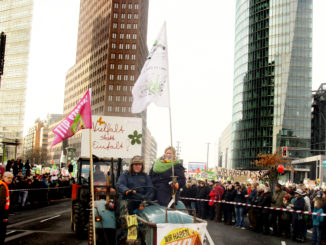The plan voted through the Parliament’s environment committee on Tuesday allows member states to ban GM crops on environmental grounds.
“This vote shows we have secured a broad consensus between the political groups in the European Parliament on this sensitive issue” said Frédérique Ries (ALDE, BE) who is steering the legislation through Parliament.
The vote was 53 votes to 11 with 2 abstentions.
“The measures approved today will secure flexibility for member states to restrict, ban the cultivation of GMO crops if they so wish. At the same time, we have secured a clear process for the authorization of GMOs at EU level, with improved safeguards and a key role for the European Food Safety Authority, which is important for us” she added.
The Environment Committee, in a statement, said that “bans could be founded upon, inter alia, the aims of environmental policy, town and country planning, land use, agricultural policy, public policy, or possible socio-economic impacts. Further possible grounds should include preventing GMO contamination of other products, persistent scientific uncertainty, the development of pesticide resistance amongst weeds and pests, invasiveness, the persistence of a GMO variety in the environment or a lack of data on the potential negative impacts of a variety”.
It added “Case-by-case risk assessments to be carried out by the European Food Safety Authority should take account of the direct, indirect, immediate, delayed and cumulative effects of GMOs on human health and the environment, and always take account of the precautionary principle”.
IFOAM’s EU Director Marco Schlüter. welcoming the vote, said “National GMO bans will only stand challenges if the new directive includes solid legal grounds, such as the environmental grounds included in the Parliament position. Member States must be able to ban GMOs due to the environmental and economic harm caused by their cultivation in their territories, as legally sound bans are the only way to effectively preserve biodiversity and to protect organic and non-GM food and farming from contamination in the long term.”
Marco Contiero, Greenpeace EU agriculture policy director also welcomed the vote. “Thumbs up to the new Parliament for wanting to secure a GM-free agriculture and environment for Europeans. Parliamentarians have radically improved the text adopted by the Council, which was heavily influenced by the UK government pro-GM stance. Today’s vote would give European countries a legally solid right to ban GM cultivation in their territory, making it difficult for the biotech industry to challenge such bans in court.”
As well as reaffirming the right of Member State to ban GM crops, the central role Corporations would have had in the process has been abandoned. While a previous compromise introduced by EU ministers in June would have required negotiations with the companies, this stage has been dropped in the new legislation.
In statement, IFOAM pointed to numerous opportunities for environmental contamination.
“Numerous cases of contamination have shown that the cultivation of GMOs inevitably leads to the contamination of organic and conventional GM-free agriculture, at all the stages of the production chain. Starting at the beginning, no farmer located next to another farmer cultivating GM crops of a similar variety can ensure his/her own produce is GM-free. In some regions of Europe, it is currently impossible to ensure certain crops are GM-free. Next, the same infrastructure is often used for storage and transport, further increasing the risk of contamination. Lastly, contamination can occur during processing in factories. The potential for contamination currently forces farmers and processors to take technical measures to protect themselves from contamination and to conduct substantive testing, which bear high costs. These costs must be borne by companies selling and growing GMOs – the ones who gain from its cultivation.”
They also pointed to procedures which they claim should be in place at the national level:
“The best guarantee against contamination is to ban GMO cultivation. Countries allowing GMO cultivation, such as Spain, should be obliged by EU law to adopt “coexistence” measures as a minimum requirement to at least give farmers and food processors a chance to prevent and mitigate contamination: polluters must pay and the victims must be compensated adequately through national liability rules. Viable liability rules for GM contamination are already in place in Austria and Germany.”
The process:
The European Parliament’s environment committee voted Tueday 11th on its second reading position on proposals from the European Commission to revise the EU system for authorising genetically-modified organisms. With EU governments having taken a different position in Council, negotiations must now take place to conclude the legislation. The proposals foresee a streamlined decision-making process for EU GMO approvals, with the possibility for member states or regions to opt-out. However, concerns have been raised about the legal certainty of these opt-outs (from the Greens/EFA)
The Parliament and Council will continue discussion into 20015, when final adoption is expected.
More:
All Arc2020 articles on GMOs
In the press:






2 Trackbacks / Pingbacks
Comments are closed.